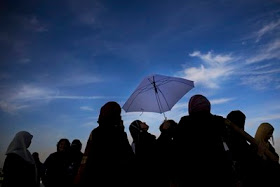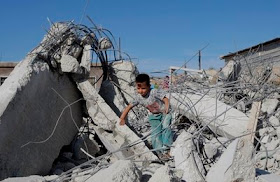Development and Peace is the official international development organization
of the Catholic Church in Canada and the Canadian member of Caritas Internationalis.
marks International Day of Solidarity with the Palestinian People
November 29, 2010

November 29th is the
UN International Day of Solidarity with the Palestinian People and DEVELOPMENT AND PEACE is marking the day by sharing the message of hope and solidarity of its Caritas partners.
Claudette Habesch, Secretary General of Caritas Jerusalem emphasizes the need for a unified international voice to ensure a better future for the next generation of Palestinians, while Joseph Donnelly, Caritas Internationalis’ delegate at the UN, calls for urgent action by the international community for an inclusive peace process. You can read their statements below.
Development and Peace collaborates with Caritas Jerusalem and other partners in the Palestinian Territories and Israel on activities that promote peace, dialogue and tolerance between various groups and respect for human rights in the region.
"In his personal statement for one of the universities, my 17 year old grandson wrote, ‘A Palestinian Christian from Jerusalem, I was born close to the birth of the Oslo Peace Accord, and grew up with the hope of a just solution and prosperity. I witnessed the disappointing collapse of the peace talks, and now, I will graduate from high school under the cloud of a political stalemate and internal Palestinian strife.’
To read a statement of a young man with his future ahead of him, commencing with hope and ending with uncertainty, a sentiment shared by all Palestinians, made me realize the immense need of solidarity with the Palestinian people. And where else to look other than towards the United Nations, a bastion of justice and a refuge of those with just causes.
November 29th is a day where every Palestinian needs to feel their story is being told and retold again. It is a day to tell people of conscious that solidarity goes beyond words. Solidarity is action to guarantee Palestinian rights on their land. Solidarity means ultimately achieving peace based on justice and restoring hope for a better future.
The Israeli occupation and its trail of human rights abuse and economic hardship is denying the young generation a future. The illegal settlements and the ‘Separation Wall’ are growing, eating up everyday our future state. Movement of people and goods is curtailed, and access is often denied. But even in these difficult situations and challenging times, something has never failed us. It is the Solidarity that you, our friends, are giving us every day.
Your support and your prayers help us to continue our mission and encourage us to reach out. We persist, through every action we take and every person we reach, to advocate for peace. With every project we implement we carry the message of love and hope.
We beseech the international community to raise their voices on this day of solidarity with the Palestinian people. The conflict must come to an end. You remain a beacon of hope."
Claudette Habesch, Secretary General, Caritas Jerusalem"For the 33rd year since 1977, the international community summons world attention to the inalienable rights of the Palestinian people on 29 November. The United Nations General Assembly Committee on the Exercise of the Inalienable Rights of the Palestinian People is mandated to acknowledge the need for and engage critical opportunities for solidarity and recognition.
Palestinians in the Middle East continue to struggle for local and global recognition of their basic human rights. These include their personal, political, social, economic and religious rights. This day of solidarity remains again this year an urgent call for concrete action and legislation to comprehensively liberate Palestinian communities from that which unjustly limits life, opportunity and natural developments toward normal existence.
Beyond long years of rhetoric caught within highly politicized circumstances, the lack of determined transparent political will on all sides has stolen life from innocent ordinary Palestinian people. Solidarity in slogans and diplomatic speeches is only significant when it is absolutely matched by actions which promote human rights, provide protection of civilians, assure justice in daily lived realities and facilitate mutually accountable mechanisms to benefit people.
Everywhere that there are Palestinians, we must see them, hear them, recognize them. At the same time we must also recognize their neighbours. In close partnership with Caritas Jerusalem, Caritas Jordan, Caritas Iraq, Caritas Lebanon, Caritas Syria – and our Caritas Middle East Region, we continue to promote and share an authentic vision that peace is possible. We have never abandoned this sustained hope and prayer. We never will.
The solidarity must be objective, humane and responsible. It must carefully encourage and dutifully facilitate real change. Transforming unjust conditions rooted in dysfunctional relationships with persons and civil authorities, lands and resources is what is necessary. Current situation must not remain status quo.
None must not be excluded from dialogue or negotiations at any level. They must be welcome at every table with Israelis as well as other Arab citizens and international stakeholders.
We continue to work for and to support every genuine initiative to tear down walls of separation. However, we know well this can only be achieved through the fullest participation of all stakeholders.
To this end, we ourselves must continue to work to bring people together, to discover anew engaging forms of solidarity which stretch all parties to see all humanity more clearly, and to exercise justice for all with willful compassion as advised in the three Abrahamic faith communities.
As in other places caught in crisis, Caritas cannot tolerate that Palestinian families remain refugees, displaced in their own homeland. We cannot accept that UN agencies established with temporary transitional mandates now reluctantly commemorate 60 years of myriad humanitarian services for countless communities all over the region. Our solidarity for these people is determined to continue.
We will never walk away. Our accompaniment means we walk with these sisters and brothers. While we provide every form of material assistance, emergency relief so often still needed, and development supports – this will never be sufficient.
Without sustained advocacy and profound peacebuilding work – human rights, daily life and future hopes will never be restored. The Palestinian people require dignity with equal justice now, today not tomorrow – this year not next year."
Joseph Cornelius Donnelly, Caritas Delegate at the UN
Prayer for Palestinian solidarity
Lord God of All,
we come to you as Caritas sisters and brothers from the four corners of the world, refugees and relatives.
We come as people who know suffering and struggle, as families and communities with hope.
We come with respect, compassion and informed solidarity with our Palestinian sisters and brothers.
We ask you hear our prayer.
We ask you hear their prayer for peace, justice, equal rights and human dignity.
Turn their brokenness into renewing wholeness and courage.
Turn their displacement into safe secure sheltering homes.Turn their long hungers into nurturing fields, foods for life so families can flourish.
May stinging betrayals of unjust law and disorder finally end so healing, forgiveness and reconciliation can begin for all peoples in the Holy Land, in this ancient/modern region.
May rhetoric and history stop repeating itself as if our Palestinian friends were not real.May all "stakeholders" see these very human beings, flesh and precious blood alive.
May their children today never relinquish their steadfast enduring belief for a better tomorrow.
Lord, God of All,
heal all who journey through desert and darkness – heal us too that we may be peacemakers.
May our simplest honest prayers unite, uplift, strengthen, respect and build up our solidarity.
May no day pass without a faithful pause which gathers us in as one human family.
One people of God from Palestine through the region and everywhere beyond every border.
Together may we be a certain path to peace that is possible, that is all we need today.
Amen.
| For more information or to request an interview, please contact: |
| Kelly Di Domenico, Communications Officer |
| 514 257-8711 ext. 365 |
| kelly.didomenico@devp.org |
 RE: I.H.T. Global Agenda 2011 Two States of Being By SERGE SCHMEMANN, SARI NUSSEIBEH and AMOS OZ
RE: I.H.T. Global Agenda 2011 Two States of Being By SERGE SCHMEMANN, SARI NUSSEIBEH and AMOS OZ


 Fatima in the West Bank
Fatima in the West Bank


































